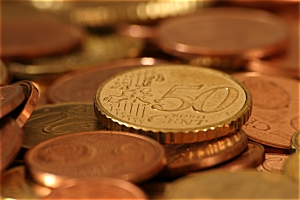英语中不同面值的硬币有不同的名字,这一点常常让中国人头痛,尤其是去国外读书和旅游的时候。下面就给大家介绍一下这些名字的来历,让你不再困惑。
 Most coins are derived from Latin words. They are named after people, places, or things.
Most coins are derived from Latin words. They are named after people, places, or things.
Even the word coin translates from the Latin "cuneus," meaningwedge, and was thusly named because early coins resembled the wedges used to coin coins. The cent, from the Latin "centum," meaning one hundred, the dime, from the Latin "decimus," meaning tenth, and the French franc, from the Latin "Franconium Rex," meaning King of the Franks, are all examples of the naming of money, the root of all evil which translates from the Latin word "mona," meaning to warn!
On to a weightier manner in which people named coins: by a scale. The English pound, translates from the Latin "pondo," meaning pound, orfrom the Latin "libra pondo," meaning a pound of weight. This method of naming coins weighed heavily in naming of the Spanish peso and of the Italian lira.
A sense of fairness dictates that some coins bear the names of the metals of which they are composed. Thus, thenickelis made of nickel. Location, not Latin, sometimes figuresprominentlyinto the naming of sum (oops!), some coins. The dollar, not always in paper form, originally hailed from the silver mines of Bohemia, where Bohemians extracted silver for the coins, and minted them in the town of Joachimsthal. Realizing that the coin they termed the Joachimsthaler, short of lacking in creativity, was rather lengthy, the Bohemian friends lost the head of the name, and kept the tail, with the end result being the thaler. The thaler eventually lost its lisp, and became dollar.
Many countries used their word for crown, for example, crown, sovereign, krone, krun, krone, corona (not the beer), to demonstrate that some crown authority initially granted permission to mint them. Other countries named coins in honor of their heroes, such as the Panamanian balboa, after the explorer Balboa, the Venezuelan Bolivar, after one of its national heroes, and the Peruvian sol, also not a beer, but the Spanish word for sun, after this ancient Incan object of worship.
wedge 楔
nickel 五分镍币
prominently 显著地
(英语点津 Annabel 编辑)